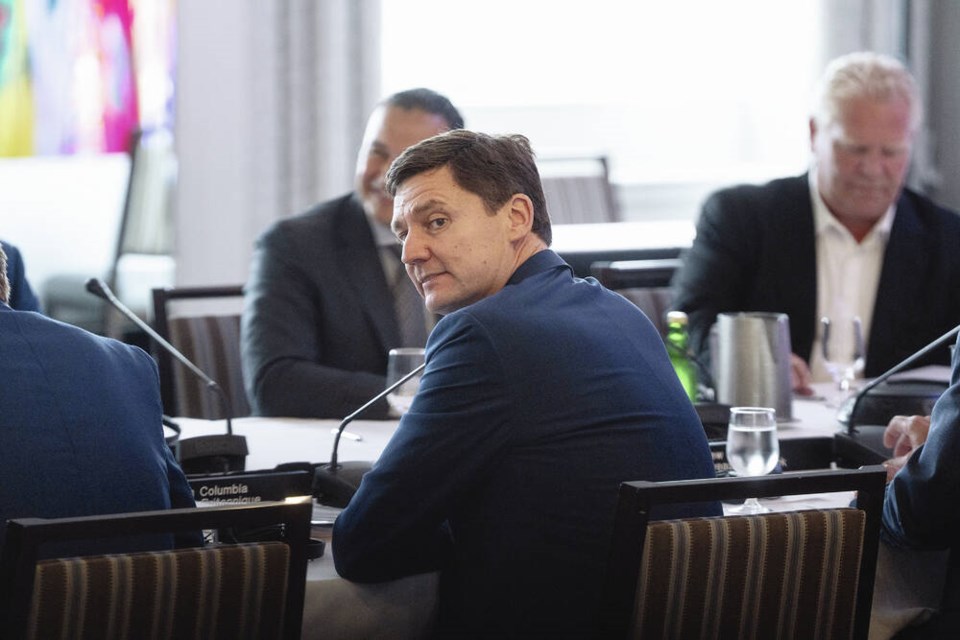Premier David Eby says B.C. will support Newfoundland and Labrador in a court challenge over equalization payments.
Eby has several times complained that Ontario and Quebec receive more generous federal funding than B.C. does, calling the existing model “completely absurd.”
Newfoundland’s main issue lies with the equalization formula. This commits Ottawa to ensuring that provincial governments have sufficient revenues to provide “reasonably comparable levels of public service at reasonably comparable levels of taxation.”
But that does not take into account the cost of providing those services, which can vary greatly between provinces.
Newfoundland spends more than any other province on health care, indeed nearly 20 per cent more than the Canadian average, in part due to the province’s widely dispersed population. But no account is taken of this fact in the equalization formula.
B.C. can make the same case. We also spend quite a bit more than the national average on health services.
Yet between 2010 and 2023, neither B.C. nor Newfoundland received a single dollar of equalization payouts (Ottawa has said Newfoundland will receive a small amount this year.)
Over that same period, Quebec collected close to $140 billion — more than the other provinces combined — and Ontario received $19 billion. Yet neither has high health-care costs; Ontario spends less than the national average.
Even so, the odds are stacked against Newfoundland or B.C. prevailing in a lawsuit. Traditionally, Canadian courts have viewed government spending as a purely political matter, to be decided by voters, not judges.
It is conceivable that either province might get lucky with a local court.
But this case, if it goes that far, is ultimately headed for the Supreme Court of Canada, and there the tradition of staying out of government budget decisions is fairly well established.
There is also the reality that the federal government can mount a counter-attack of its own.
If B.C. is spending more on health services than some other provinces, Ottawa might ask: Whose fault is that? Isn’t that a marker of poor management rather than federal indifference?
More important, any effort to redistribute equalization payments would generate outrage in Quebec. And that is no small matter.
Currently, according to a recent Leger poll, Quebec’s Coalition Avenir government is in a tail-spin, with the Parti Québécois well ahead.
If an election were held tomorrow, the PQ would likely win a majority position. That likelihood would become a near certainty if equalization payments are redistributed.
Indeed it may very well be that even the lawsuit alone, regardless of its eventual outcome, would generate both a PQ administration, and with it, perhaps another referendum on separating.
Yet the feeling of resentment across the western provinces, Alberta and Saskatchewan in particular, cannot be denied. If something isn’t done, that resentment may boil over and do permanent damage to the fabric of our country.
One solution could be to rearrange the formula that underlies equalization payments. This was done once before, in 2007, and might offer a diplomatic escape hatch.
The problem is, however, that any change which resulted in Quebec receiving less would trigger outright rebellion in that province. Yet if Quebec were assured no reduction, but Newfoundland and B.C. were brought in, what about Alberta and Saskatchewan, neither of whom currently get anything?
A better solution might be to increase Canada Health Transfer funding. This would help provinces cover increasing health-care costs, and move Ottawa closer to paying a fair share.
If that step were taken there would be winners all round, instead of winners and sore losers if equalization is redistributed.
But we also need the western premiers to cool their rhetoric. Busting up the country for a purely local audience is no part of leadership.
>>> To comment on this article, write a letter to the editor: [email protected]



